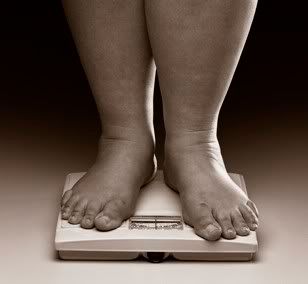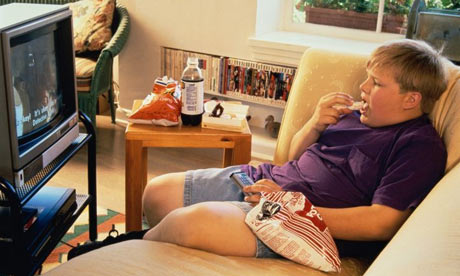 Americans seem obsessed with dieting to lose weight. Even though 90-95% of all diets fail, that doesn't keep them from trying, dreaming of looking like those models in the magazines.
Americans seem obsessed with dieting to lose weight. Even though 90-95% of all diets fail, that doesn't keep them from trying, dreaming of looking like those models in the magazines.Most people who diet will gain back the weight they lost, often surpassing it. Then they try another diet & repeat the cycle. This phenomenon of Yo-Yo-dieting is probably is worse than simply staying at the previous weight while reasonably active.
I have to admit right here that I am one of those lucky people who has never counted calories or carbs. I'm certainly not skinny (heavy-boned German with hefty boobs), and would never be picked for a bathing suit commercial, but luckily I've never been HUGE. I credit lucky genes for the largest part, and simply being fairly active. But the middle-age spread is catching up with me, and I could certainly use to shed a few pounds and tighten up the flab around the midriff ... But I'm determined to approach improving my weight&health without crazy dieting schemes.
Obviously being overweight is not healthy -- it increases the risk of heart disease, diabetes, yada-yada-yada. Enough already -- we already KNOW that! But then why can we not manage to keep our bodies healthy?
America is facing a weight/health crisis DESPITE the fact that we've been told for some 35 years that being overweight increases health risks, and that we ought to eat less saturated fats. So we buy products touting health claims of "Low fat", "reduced cholesterol" etc., and are still getting fatter and fatter. What gives?
Seems like we've been replacing saturated fats with the wrong kinds of fats, and we're filling up on empty calories. And our portion sizes (even our plate sizes) are bigger -- we're indeed eating significantly more calories than before we started the "lower fat diet". And we're less active than ever before. No wonder Americans (and many Western countries are heading the same direction) are getting fatter, and so are the kids: Childhood obesity is becoming a serious problem.
There are more and more overweight children, and our society seems not to know how to help them. Just telling the kids to "eat less and e
 xercise more" is not cutting it -- adults are not exactly good role models in that department! How do you expect kids to get off the couch & onto their bikes if the adults drive everywhere in their cars, and think of the world as way too dangerous a place to step outside your front door?
xercise more" is not cutting it -- adults are not exactly good role models in that department! How do you expect kids to get off the couch & onto their bikes if the adults drive everywhere in their cars, and think of the world as way too dangerous a place to step outside your front door?Maybe this TV-watching kid is watching the documentary Supersize Me? Maybe he's already given up? In the kid's defense, genetics do play a role too, and he's probably not exactly inherited skinny genes -- but still, it's so sad to see him embarking so young on a lifetime of health problems!
QUESTION: Do we eat to live, or live to eat?
The problem with our Western diet is that we've lost touch with real food. Our ancestors would barely recognize what's on the shelves of our stores: long lists of ingredients, many of which we can hardly even pronounce. In his book In Defense of Food, Michael Pollan advises us to eat what our ancestors would recognize as food -- that is stay away from highly processed food stuffs, and eat real food, preferably grown locally, without heavy inputs of industrial agriculture (chemicals, fertilizers, etc.) -- his description of what goes on in feedlots might make you want to puke & forgo meat altogether!
I still maintain that humans are omnivores, and eating meat is a natural part of our biology, but we're certainly not meant to eat the huge amounts of animal proteins, or the amounts of refined simple carbohydrates (white flour and sugar) that have become standard in the so-called Western Diet.
Michael Pollan's book is fascinating, and I like his 7 simple words to guide us:
EAT FOOD. NOT TOO MUCH. MOSTLY PLANTS.
Here are two other books I read last year that dealt with some of the more psychological aspects of the problems people have with eating and weight control: Mindless Eating by Brian Wansink, and Intuitive Eating by Evelyn Tribole and Elyse Resch -- different approaches, but both very valid looks at the WHY: what goes on when we overeat, and how can we change that?
I learned a lot from both of these books. Sometimes we just eat unconsciously, or for emotional reasons. We've learned to ignore clues our own body/mind gives us about hunger or fullness. One interesting experiment that Wansick's team did was the "bottomless" bowl of soup: the bowl was being re-filled from below, and people kept on eating and eating, unaware that they were eating WAY more than usual. The comment when asked how they liked the soup was something like "That soup was really filling" -- yeah, they ate what, 4 or 5 bowls?!? But they thought they were eating their normal amounts!
The principles of eating more intuitively are also very helpful, whether you're just trying to get to a healthier weight and lifestyle, or struggling with major food issues such as eating disorders:
1. Reject the Diet Mentality
2. Honor your Hunger
3. Make Peace with Food
4. Challenge the Food Police
5. Feel your Fullness
6. Discover the Satisfaction Factor
7. Cope with your Emotions without using Food
8. Respect your Body
9. Exercise -- feel the Difference
10. Honor your Health -- Gentle Nutrition
One of the "aha" moments for me was how they explained that denying yourself certain foods (chocolate, for example) will end up making you crave that food, setting yourself up for a failure (in a "weak" moment you "cheat", then end up eating a whole box of chocolates, and feel like a total failure, your image of yourself is that you "failed" to control yourself, spiraling into further depression over food...) Instead, go ahead and give yourself permission -- if there are no "forbidden" foods, then these foods will lose that power over you, and you'll find yourself not craving it... This is such a gentler approach, and I think could really help people who are struggling with unrealistic expectations of diets and body image.
Another book I picked up recently is by Mark Bittman: Food Matters, where he advocates more "conscious eating" by eating less meat, more local produce, and reducing amount of highly-processed food -- for our health, AND for the health of our planet.
He mentions that he lost extra weight and saw a marked improvement in his health just by making these simple changes -- cutting out meat and processed food out of 2 of his 3 daily meals. Bittman writes that for him it worked well to eat "Vegan until 6pm", something it turns out also resonated with my husband, who is happily eating his veggies for lunch these days. I do wish he'd ask some whole wheat grains to that, because he he just gets so darn hungry when he gets home for dinner (I bet he'd do fine with Ramadan, where you have to wait until sundown to eat)! He has replaced his formerly high-carb midnight snack with fruit, a step in the right direction. Poor guy, he just gets so "peckish"...
For myself and my family, I'm just aiming for a greater awareness of healthy eating in our daily lives. Since we started buying our produce in CSA boxes and I started a blog (Borealkitchen) to guide me in cooking with all that produce -- well, I've noticed that my pants are sitting looser on my waist -- darn it, they won't stay up!
I think the biggest factor in eating healthier is that with more vegetables around, I eat less of other foods. I'm realizing just how easy it is to pick up processed foods -- they are everywhere! When I'm in the grocery store I try to make sure I don't shop hungry, and try to stay on the perimeter rather than in the middle isles where all the food comes in boxes. After all my reading I realize that they're full of empty calories ("refined" grains, which means the fiber and kernels are removed -- needing "enrichment" to put the nutrients back in!), and the long shelf-life was "bought" by replacing healthy (unstable) fats with unhealthy (hydrogenated) fats.
Does that mean no more OREOS for the kids' snacks?
I'm not trying out for the Ogre-mom of the Year award, but yes, I buy far less of that stuff , and try to get around to making healthier homemade treats more often instead.
It's not easy to keep our household supplied with "healthy" yet appealing snacks for the ever-hungry hordes that descend on the kitchen every few hours -- but somehow homemade baked goods or bananas with organic peanut butter is winning, and neither kid is starving or complaining too loudly. (And I have to add that both kids are thin as rails -- but so were hubby and I at their ages, the inevitable bulge around the middle did not set in until around 40!)
So I try to shop, cook and feed us healthy meals, keeping an even-keeled perspective (I see little point in getting into a religious fervor over food). I just want to stay healthy, balanced & make peace with food -- it's what keeps us alive and healthy, and we may as well enjoy it too.

Kitchen Sister commented on the twin blog (Borealkraut) where I posted this same diatribe:
ReplyDeleteBeautiful! Add to your list of non-diet books: French Women Don't Get Fat. It's has little tidbits of diet in it, but it's main focus is on how to enjoy good food in season- the enjoyment and awareness fill you up on far less food/calories than you would have on fat-free fritos or whatever.
The Shwarzbein Principle is VERY MUCH a diet book (complete with menus, recipes, phases, and everything), but when you get rid of all that, Dr. Schwarzbein is saying, "DON'T eat low-fat processed foods. Eat good fats from natural sources, anything that you could theoretically hunt, gather, or grow yourself."
She also goes through the science of digestion, satiety, and diabetes, it's quite interesting. She stresses the importance of balance in everything: eat balanced meals with enough fat and carbohydrates (in addition to the universally accepted protein and vegetables) but from good sources, manage your stress, get enough sleep, and get balanced exercise too: flexibility, strength, and endurance.
I swear, we're living parallel lives in different time zones. You are a couple notches of self discovery ahead of me though, as I THINK many of your same food ideas but haven't implemented them yet. I still cheat and buy packaged snacks for lunchboxes. I have personally cut back significantly on red meat, but the rest of the fam still likes it. And I'd love a CSA box, but I get too much stuff out of my own garden and garden produce is really easy to come by at farm stands in the summer. Funny...my daughter saw a white egg at my mom's house a few weeks ago and wondered what was wrong with it!
ReplyDelete